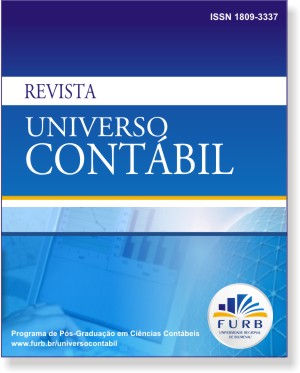EL BALANCED SCORECARD Y LA ORGANIZACIÓN DEL APRENDIZAJE: ESTUDIO DE CASO
DOI:
https://doi.org/10.4270/ruc.20128Palabras clave:
Balanced Scorecard. Organizaciones de Aprendizaje. Gestión Estratégica. Entorno Organizacional.Resumen
El Balanced Scorecard (BSC) es una respuesta a las exigencias de la realidad socio-económica, un proceso que parece favorecer el desarrollo del aprendizaje en las organizaciones. Este estudio examina esta presunción. Para nuestro estudio hemos definido doce características esenciales para una organización de aprendizaje, analizadas en tres categorías, agrupados en una cuadrícula de percepción; hacemos también un análisis crítico del concepto BSC a la luz de estas características. Basado en este objeto de cuadrícula en dos, hemos caracterizado la compañía: antes de iniciar el proyecto BSC y dieciocho meses después de su inicio. Comparando las dos caracterizaciones tratamos de evaluar cómo varió su capacidad de aprendizaje organizacional. Hemos encontrado que esta capacidad ha aumentado: la empresa ha mejorado como organización de aprendizaje, esencialmente cuando evaluado en dos de las categorías definidas: clima organizacional y liderazgo.
Descargas
Citas
ARGYRIS, C; KAPLAN, R. Implementing New Knowledge: the case of activity based costing. Accounting Horizons, v. 8, n. 3, p. 83-105, 1994.
ATKINSON, A.; BANKER, R.; Kaplan, R.; Young, S. Management Accounting. NJ: Prentice Hall, 1997.
BONTIS, N.; CHUA, W.; RICHARDSON, S. Intellectual capital and the nature of business in Malaysia. Journal of Intellectual Capital, v. 1, n. 1, p. 85-100, 2000. http://dx.doi.org/10.1108/14691930010324188
BROWN, J.; DUGUID, P. Organizational Learning and Communities-of-Practice: Toward a Unified View of Working, Learning and Innovation. Organization Science, v. 2, n. 1, p. 40-57, 1991. http://dx.doi.org/10.1287/orsc.2.1.40
COOPEY, J. The learning Organization Power, Politics and Ideology. Management Learning, v. 26, n. 2, p. 193-213, 1995. http://dx.doi.org/10.1177/135050769502600204
CRAVENS, K; OLIVER, E.; STEWART J. Can a Positive Approach to Performance Evaluation Help Accomplish Your Goals? Business Horizons, n. 53, p. 269-279, 2010. http://dx.doi.org/10.1016/j.bushor.2009.09.005
CYERT, R.; MARCH, J. Behavioral Theory of a Firm. Englewood Cliffs: Prentice-Hall, 1963.
FERNANDES, A. Tipologia da Aprendizagem Organizacional: Teorias e Estudos. Lisboa: Livros Horizonte, 2007.
GARVIN, D.; EDMONDSON A. C.; GINO, F. Is yours a Learning Organization? Harvard Business Review, v. 86, n.3, p. 109-116, 2008.
JUNG, Y; TAKEUCHI, N. Performance Implications for the Relationships Among Top Management Leadership, Organizational Culture, and Appraisal Practice: Testing Two Theory-based Models of Organizational Learning Theory in Japan. The International Journal of Human Resource Management. v. 221, p. 1931-1850, 2010. http://dx.doi.org/10.1080/09585192.2010.505093
KAPLAN, R.; NORTON, D. The Balanced Scorecard – Measures that Drive Performance. Harvard Business Review, v. 70, n. 1, p. 71-79, 1992.
KAPLAN, R.; NORTON, D. The Balanced Scorecard: Translating Strategy into Action. Boston: Harvard Business School Press, 1996a.
KAPLAN, R.; NORTON, D. Using the Balanced Scorecard as a Strategic Management System. Harvard Business Review, v. 74, n.1, p. 75-85, 1996b.
KAPLAN, R.; NORTON, D. Strategy Maps: Converting Intangible Assets into Tangible Outcomes. Harvard Business Publishing Corporation, 2004.
KAPLAN, R.; NORTON, D. Alignment: Using the Balance Scorecard to Create Corporate Synergies. Harvard Business School Press, 2006.
LINES, R.; SÃENZ, J.; ARAMBURU, N. Organizational Learning as a By-product of Justifications for Change. Journal of Change Management. v. 11, p. 163-184, 2011. http://dx.doi.org/10.1080/14697017.2010.548340
LIPE, M. G.; SALTERIO, S. E. The Balanced Scorecard: Judgmental Effects of Common and Unique Performance Measures. The Accounting Review, v. 75, n. 3, p. 283-298, 2000. http://dx.doi.org/10.2308/accr.2000.75.3.283
MALINA, M.; SELTO, F. Communicating and controlling strategy: an empirical study of the effectiveness of the BSC. Journal of Management Accounting Research, v. 13, p. 47–90, 2001. http://dx.doi.org/10.2308/jmar.2001.13.1.47
MCKINNON, J. Reliability and Validity in Field Research: Some Strategies and Tactics. Accounting, Auditing and Accountability Journal, v.1, p. 34-54, 1988. http://dx.doi.org/10.1108/EUM0000000004619
NONAKA, I.; TAKEUCHI, H. The knowledge Creating Company: How Japanese Companies Create the Dynamics of Innovation. NY: Oxford University Press, 1995.
NØRREKLIT, H. The balanced on the balanced scorecard – a critical analysis of some of its assumptions. Management Accounting Research, v. 11, n. 1, p. 65-88, 2000. http://dx.doi.org/10.1006/mare.1999.0121
NØRREKLIT, L.; SCHOENFELD, H. M. Resources of the Firm, Creating, Controlling and Accounting. Copenhagen: DJØF Publishing, 1996.
NØRREKLIT, H.; SCHOENFELD, H. M. Controlling Multinational Companies an Attempt to Analyze some Unresolved Issues. Aarhus: The Aarhus School of Business, 1998.
OLVE, N. G.; PETRI, C. J.; ROY, J.; ROY, S. Twelve years later: Understanding and realizing the value of balanced scorecards. Ivey Business Journal, v. 68, n. 5, p. 1-7, 2004.
OTLEY, D.; BERRY, A. Case Study Research in Management Accounting and Control. Management Accounting Research. v. 5, p. 45-65, 1994. http://dx.doi.org/10.1006/mare.1994.1004
PAPALEXANDRIS, A.; IOANNOU, G.; PRASTACOS, G. Implementing the Balanced Scorecard in Greece: a Software Firm’s Experience. Long Range Planning, v. 37, n. 4, p 351–366, 2004. http://dx.doi.org/10.1016/j.lrp.2004.05.002
SENGE, P. The Fifth Discipline: The Art and Pratice of Learning Organazition. NY: Doubleday, 1990.
SPECKBACHER, G.; BISCHOF, J.; PFEIFFER, T. A descriptive analysis on the implementation of Balanced Scorecards in German-speaking countries. Management Accounting Research, v. 14, n. 4, p. 361-387, 2003. http://dx.doi.org/10.1016/ j.mar.2003.10.001
TAYLER, W. The Balanced Scorecard as a Strategy-Evaluation tool: The Effects os Implementation Involvement and a Causal-Chain Focus. The Accounting Review. v. 85, n. 3, p.1095-1117, 2010. http://dx.doi.org/10.2308/accr.2010.85.3.1095
WIERSMA, E. For Which Purposes do Managers use Balanced Scorecards? An Empirical study. Management Accounting Research. n. 20, p. 239-251, 2009. http://dx.doi.org/10.1016/j.mar.2009.06.001
YIN, R. Case Study Research: Design and Methods (2ª. ed). Thousand Oaks: Sage Publications, 1994.
Publicado
Cómo citar
Número
Sección
Licencia
Los derechos de autor de los artículos publicados en esta revista son del autor, y los derechos de primera publicación son de la revista. Por aparecer en esta revista de acceso público los artículos son de uso gratuito, con atribuciones específicas, en aplicaciones educativas y no comerciales. La revista permitirá el uso de trabajos publicados con fines no comerciales, incluso el derecho a enviar el trabajo a bases de datos de acceso público.


